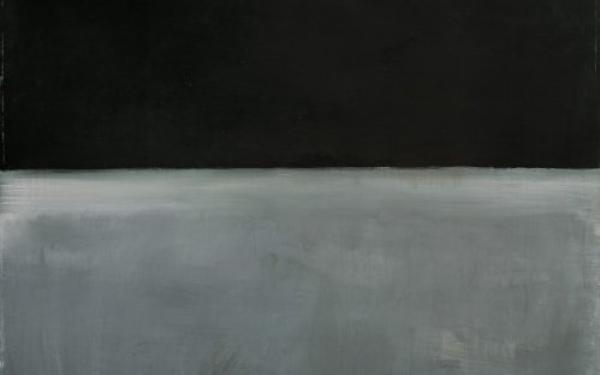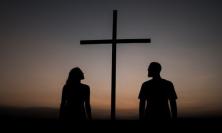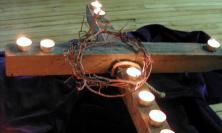We tend to think of Holy Saturday as a day ‘in between’ Good Friday and Easter Sunday, without any particular significance of its own. But this could not be further from the truth, says James Hanvey SJ. It is a day that resists all of our attempts to understand it, but nonetheless we must ‘live in the realities of Holy Saturday’.
We don’t know what to do with it. Somehow it gets lost between the solemn exhaustion of Good Friday and the excitement of the Easter Vigil. Yet it is not an interlude between acts while the scenery changes behind the curtain. Neither is it a time when God continues to work in some other realm of redemption like the descent into Hell. All that can be done, all that needs to be done, is done on the cross. We must not run away from its finality. It is over; all our lives we will be discovering the depths of that closure. We cannot even begin to appreciate what it means if we do not live in the realities of Holy Saturday. Without the experience of this day neither our hearts nor minds, not even our souls, are prepared for Good Friday or Easter Morning.
It is only human to want to avoid the vast silence of this day, its stillness which stretches out without any promise of relief. It is only human to want to shake off the finality, the shock and numbness of death, to release ourselves from the lingering memory of what we have witnessed. It is only human to want to flee from its emptiness, the stark, hard, unyielding bareness of absence. So we run – either physically, through activity, preparing for the holidays, making things ready for the liturgy; or intellectually and spiritually by anticipating the consolations of Easter. However we do it, we want to escape the aftermath of death, God’s death, and the vacuum which refuses to be resolved or dissolved. On Holy Saturday we all become Pelagians finding every good excuse to make something happen. In the dead time that lies between Good Friday and Easter Sunday we encounter the terror of our own impotence. There is no magic, no word, no clever formula to bring him back; to restore the dream and secure the hope. We go on living but can we trust life again? Can we trust ourselves again?
We should mourn and start the rituals of grieving for all the unlived lives, all our own unlived lives. But even then Holy Saturday resists all our attempts to change it, to naturalise and interpret it in some sort of therapeutic framework. It is a different sort of time, one that does not move to our rhythms. This day holds us in its bleak starkness. It is not only the trauma of a tortured, disfigured, broken and lifeless body, or the scandal of goodness and innocence systematically dismembered and destroyed. Even the loving rituals of a hasty burial or the familiar routines of religious piety and festival cannot lessen it. Memory cannot leap over the reality of Good Friday to return to happier times. Memory, too, is held disoriented, dislocated and disconnected, a refugee lost in the alien land of Holy Saturday. Deep in the folds of our own bruised and shocked souls moves another more sinister and primal fear. Like a black serpent sensing the closeness of its prey, quietly it uncoils within us, poised to strike: the terror of Death.
This is not death through natural causes. It does not come at the end of a natural process or a long life. Its very unnaturalness shatters all our attempts to make it comprehensible and familiar. It is an inflicted death which reveals the terror of ultimate power: death itself can be instrumentalised. The cross, its torture and humiliation, was the deliberate and ruthless manifestation of Roman power, but it is also the symbol of every regime which makes death its instrument. Not only is this a physical death, it is death as claim and possession; it is death which advertises complete ownership. It makes the body of the victim its own symbol and inscribes its name upon flesh, bone and muscle. ‘You are ours. Here, you see what we can do, if we choose.’
Now the State, the Emperor, the President or the CEO performs the liturgy of their power in the spectacle of a systematic, calculated and carefully controlled death. It is meant to be public spectacle because it is meant to serve subjection through terror. Its purpose is not just to generate bodily compliance, but to colonise the imagination and the soul. This is not just the reduction of the will to impotence, but the rendition of being itself to the dark country of which death is only the threshold: the abyss of nothingness and the hell of living without life, of being only a property. We are allowed the illusion of our freedom; to get on with our lives and maybe even prosper, but only on the condition that we acknowledge the gods who can sacrifice us at will on the altar of death.
Only in the silence of Holy Saturday can we see the true terror of the cross. It exposes the ultimate source of the secular gods’ power - the god of this world, the god of despair; the god who can crucify God. On this day, all our dreams fall away, our hopes scatter like dust in the wind; the fragile world we build of meaning, of goodness, of love, is only a poor, ragged shelter in which to hide from the frozen dark of an endless night. If we have the courage to place our ear to the silence of Holy Saturday we will hear a savage laughter. It is the gods of this world laughing at our hope for a saviour.
There is also the guilt: could we have done something? In the space of Holy Saturday we have to live with all our betrayals. Even when we have loved to the end, even when we have taken the risks and keep our vigil before the cross, even when we have taken the body and laid it to rest, it is not enough. Our love, our loyalty, all our skill and ingenuity, is not enough. It cannot save him. On Holy Saturday we live the limits of our love. We do not stop loving, but even though our love may be endless, we know it cannot be enough. We love now in pain, in longing; we love now on the cross of our own finiteness.
If we enter into the silence of Holy Saturday, its bareness gives us no distractions. There is nowhere to go but inwards; into the very empty places of our own soul and imagination. Holy Saturday takes us beyond grief and mourning into the deepest purification of our faith. Like the bare altar and the empty tabernacle, this Saturday strips us of all comfort. It even strips away faith itself, leaving us so utterly naked and impotent that we can only wait.
If we can stay in this strange and desolate place waiting, our spiritual eyes become accustomed to this other dimension. We will begin to discern that it has brought us to a way that only Christ has opened up. In the very waiting and living in our own powerlessness, we have already faced the terror of the instruments, the torture, the primal fear that laid its claim upon us. If only we can stay there waiting we will begin to understand that this silence and emptiness is not God’s powerlessness, his death – but his Sabbath: it is an end; it is a completion and it is also a new beginning. It is truly a ‘holy’ Saturday, not an interlude but a hallowing of all of our times of waiting. Without it we would never see into the depths of Good Friday or adjust our understanding to grasp the magnitude and meaning of Easter morning.
In the emptiness of waiting, we begin to learn something that the god of this world cannot bear, the knowledge that it does not want us to know: at the very point of our failure and betrayals, when we taste our own impotence and limit, if we are not afraid to live in his absence, we discover him.
Holy Saturday is his time. It is the time when we learn to trust his sacrifice of love which death can neither subjugate nor comprehend. In Holy Saturday we begin to see that it is he who has made death his instrument; not to terrorise us into submission, but to call us more intimately to his side. In the purifying darkness of Holy Saturday we discover the Sabbath of our waiting. We come to the end of our way and the beginning of his. It is only Christ who can carry us over into Easter morning, and so it is with all the Holy Saturdays of our life.
James Hanvey SJ holds the Lo Schiavo Chair in Catholic Social Thought at the University of San Francisco.





